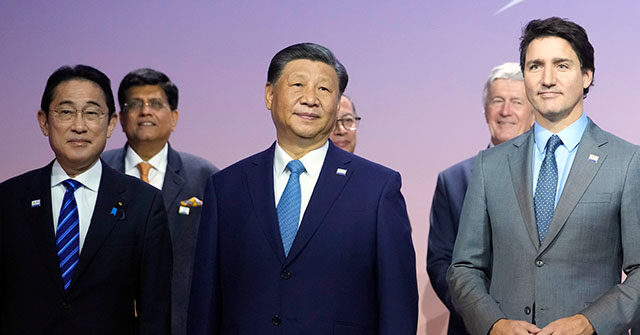Top News
Hayward: Coward Xi Jinping Ducks U.S. Journalists for Swanky Dinner with Fawning CEOs

President Joe Biden was left to awkwardly manage a solo press conference on Wednesday after his four-hour meeting with Chinese dictator Xi Jinping in San Francisco.
Xi preferred to avoid the press, scooting off to his reception with big-name American businessmen and leaving the Chinese Foreign Ministry to handle his public relations work.
If Xi had done a joint presser with Biden and taken some questions from the press, he might have avoided the awkward moment when Biden told a reporter he still views Xi as a “dictator.” It seems unlikely Biden would have answered that question the same way if Xi was standing behind him, although one never knows what will emerge from Biden’s mouth when he speaks off the cuff.
Every moment of Xi’s trip to San Francisco was tightly scripted, so the dictator was not about to let reporters take pot shots at him. After his meeting with Biden, Xi dashed over to a dinner with business executives, hosted by the U.S. China Business Council and National Committee on U.S.-China Relations.
The guest list included Apple CEO Tim Cook, Elon Musk of Tesla and X, Steve Schwarzman of Blackstone, Larry Fink of BlackRock, and executives from major companies from Boeing to Pfizer. Several members of the Biden administration were present, including Secretary of Commerce Gina Raimondo, and Xi brought some of his own top officials as well.
Xi’s keynote address pointedly refuted some of President Biden’s language on China, urging his audience of American tycoons to view Xi’s genocidal regime as a “partner” instead of a “competitor” or security threat.
Xi made some efforts to woo back Western investors who have grown nervous about doing business in China since the Wuhan coronavirus pandemic, including pledges that China only wants peace and stability.
Inquisitive journalists might have asked Xi some follow-up questions, such as why peace-loving China is ramming into Philippine ships in the South China Sea, but there was no indication that any of the assembled CEOs posed any such awkward queries. The American business executives gave Xi no less than three standing ovations before and after his speech.
“Whatever stage of development it may reach, China will never pursue hegemony or expansion, and will never impose its will on others. China does not seek spheres of influence, and will not fight a cold war or a hot war with anyone,” Xi said in his speech. It seems likely that at least one reporter at a press conference would have asked why China is busy drawing maps that show it owning the entire South China Sea if it is not interested in “expansion” or “hegemony.”
Xi might also have found himself fielding tough questions about the Uyghur genocide if he faced more determined interlocutors than a gaggle of CEOs hoping to make big money in China. Mike Gallagher (R-WI), chair of the House Select Committee on China, sent a letter to the hosts of the dinner on Monday saying it was “unconscionable” for them to give the author of the Uyghur genocide a platform where he faced no challenges.
Xi let Chinese Communist agencies and state media do most of his talking after meeting with Biden. China’s heavily censored social media filled up with soft and fuzzy portraits of Xi and Biden strolling through the Filoli estate near San Francisco, while state-controlled newspapers published warm reminiscences about Xi’s previous trips to America.
The Chinese Foreign Ministry handled the response to Biden calling Xi a dictator, snapping that the American president’s remarks were “irresponsible” and “extremely wrong.”
The Foreign Ministry’s summary of the Biden-Xi meeting, delivered on Thursday morning by spokeswoman Mao Ning, was quite a bit different than the pitch made to reporters by Biden administration officials on Wednesday evening. Mao’s version had Xi doing more talking, and Biden doing more listening:
The two heads of state had a candid and in-depth exchange of views. They held further discussions about the right way for China and the US to get along, clearly outlined the shared responsibilities of our two major countries, and came up with a future-oriented “San Francisco vision”. The meeting identified the direction and drew up a blueprint for the sound, steady and sustained development of bilateral ties. It was a positive, comprehensive and constructive meeting of strategic and far-reaching significance.
President Xi elaborated on China’s position on stabilizing and improving China-US relations. He pointed out that both sides need to work together to form a correct perception, effectively manage differences, advance mutually-beneficial cooperation, assume due responsibilities as major countries, and promote people-to-people and cultural exchanges. In this way, we will be building five pillars for the stable growth of bilateral ties and embracing a new vision for our relationship. This major event in international relations today will no doubt go down as a milestone in China-US relations.
It was a fruitful meeting with over 20 common understandings in political, diplomatic, cultural and people-to-people exchanges, global governance, military, security and other fields. These important common understandings and deliverables further attest to the wide-ranging common interests shared by China and the US. They also prove that mutual benefit is the defining feature of China-US relations and dialogue and cooperation is the only right choice for both sides.
The only “deliverables” Biden’s people seemed eager to discuss on Wednesday were Xi agreeing to restore communications between the U.S. and Chinese militaries, and Xi agreeing to do more against fentanyl suppliers.
The Chinese government keeps stressing how much Xi loves America and its people, but that love apparently does not extend to answering questions from anyone who isn’t ready to invest at least a billion dollars in China.
Read the full article here


















